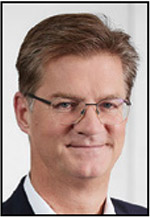In this exclusive interview, Jens Cuntze, member of Clariant’s Executive Steering Committee, offers his perspective on the goals, challenges and accomplishments of the Business Unit Catalysts, as well as the challenges faced by the chemical process industries
 Jens Cuntze is Clariant’s business president of the Business Unit Catalysts and the Asia-Pacific (APAC) Region. Cuntze holds a Ph.D. in chemistry from the Swiss Federal Institute of Technology (ETH Zurich), as well as an M.B.A. degree. He started his career as a consultant, and later associate principal at McKinsey with a focus on the chemical industry. In 2003, Cuntze joined Clariant as head of strategic planning for the Division Life Science & Electronic Chemicals, followed by several management positions in the business and in corporate functions. From 2013 until 2018, he held the positions of vice president and head of the Business Segment Petrochemical Catalysts (former Südchemie business), as well as board member of two global joint ventures. Then he served as head of Corporate Planning & Strategy at Clariant until July 2022.
Jens Cuntze is Clariant’s business president of the Business Unit Catalysts and the Asia-Pacific (APAC) Region. Cuntze holds a Ph.D. in chemistry from the Swiss Federal Institute of Technology (ETH Zurich), as well as an M.B.A. degree. He started his career as a consultant, and later associate principal at McKinsey with a focus on the chemical industry. In 2003, Cuntze joined Clariant as head of strategic planning for the Division Life Science & Electronic Chemicals, followed by several management positions in the business and in corporate functions. From 2013 until 2018, he held the positions of vice president and head of the Business Segment Petrochemical Catalysts (former Südchemie business), as well as board member of two global joint ventures. Then he served as head of Corporate Planning & Strategy at Clariant until July 2022.
EXECUTIVE INTERVIEW
How would you describe your company?
Clariant is a focused specialty chemical company led by the overarching purpose of “Greater chemistry – between people and planet.” By connecting customer focus, innovation, and people, the company creates solutions to foster sustainability in different industries. On December 31, 2023, Clariant had a staff of 10,481 with sales of CHF 4.377 billion for the full year. Clariant conducts its business through the three Business Units: Care Chemicals, Catalysts and Adsorbents & Additives and has its headquarters in Switzerland.
Clariant’s Business Unit Catalysts develops and manufactures innovative catalyst solutions that enable chemical producers to increase efficiency, lower emissions and transition toward sustainable production.
With our global reach, established research and development capabilities and broad portfolio, we provide technologies to optimize processes across multiple industries including olefins, syngas and specialties.
What goals are you trying to achieve?
We provide innovative technologies that optimize yields, minimize waste and help decarbonize the downstream markets we serve. As a specialty chemical company, we have a great chance to benefit from and drive the sustainability transformation and will continue to strongly support our customers here. In 2023, sales in Catalysts increased by 9 % in local currency with an increased share of innovation-based sales.
What challenges does your company face?
Clariant showed a resilient performance in 2023 as our business model is characterized by a strong focus on innovation, sustainability and our customers.
For the chemical industry, 2023 overall has been a year of continued challenges, impacted by the uncertain macroeconomic and geopolitical environment, with some weaknesses in end markets.
What challenges do you see for the chemical process industries as a whole?
The chemical process industries (CPI) face several challenges globally and regionally. Access to competitive feedstocks and energy, as well as oversupply, in some of the markets are examples. In China, although economic growth is tending to slow down, due to its size, the market will generate more than half of the growth for the global chemical industry. The market remains very dynamic; however, some industries have built up overcapacities because the recovery of growth fell short of some expectations.
What accomplishments are you most excited about?
In 2023, Clariant’s catalyst technologies enabled emission reductions of more than 40 million tons of carbon dioxide equivalent (CO2e) in customers’ chemical processes across a wide range of industrial sectors.
For perspective, this impact exceeds Clariant’s total carbon footprint by a factor of eight.
Lighthouse projects, like a large European e-methanol plant, further validate our innovations in decarbonization. Our MegaMax* catalyst will help convert renewable CO2 into 32,000 tons per year of carbon-neutral methanol for the shipping industry. A large portion of the plant’s annual yield is already allocated to the logistics group Maersk for powering its first-ever carbon-neutral maritime fleet.
Another great innovation we launched last year is our cloud-based AI-platform Clarity* that provides customers 24/7 access to their real-time catalyst performance data, as well as access to advanced visualization, analysis and monitoring tools. Clarity supports all Clariant catalyst applications, allowing end-to-end encrypted data sharing, with key performance indicators visualized in customizable dashboards. The user interface also connects customers directly with Clariant’s experts for technical exchange and guidance. Since its launch, Clarity has been adopted by more than 90 plants and is serving more than 400 active users in 28 countries around the world.
* MegaMax and Clarity are trademarks of Clariant
Department Manager: Dorothy Lozowski
Company: Clariant
Number of Employees: Approximately 10,480
Corporate Headquarters: Muttenz, Switzerland
Locations: 68 production sites
Leadership: Conrad Keijzer, CEO
Main Products: Specialty chemicals
Website: www.clariant.com